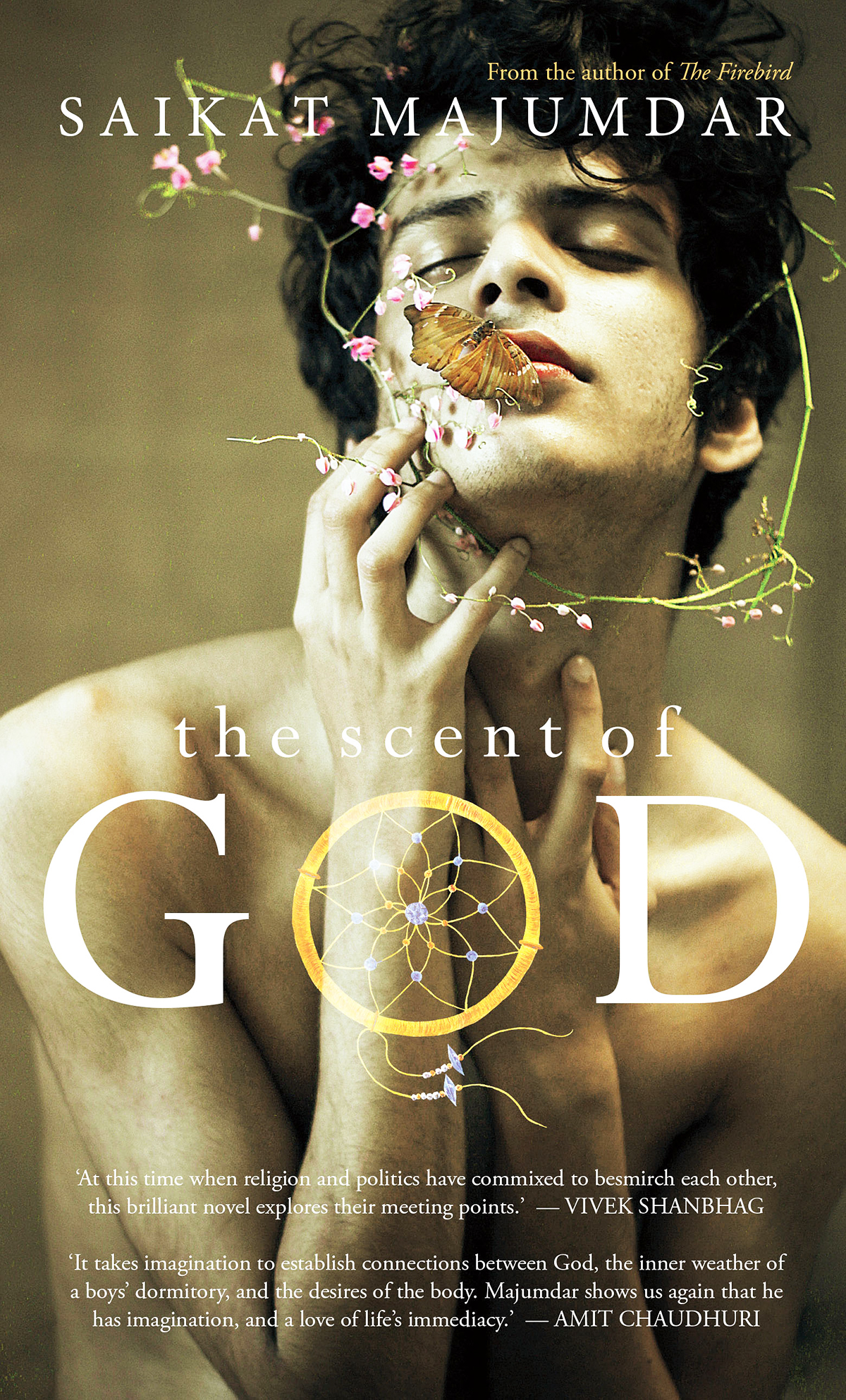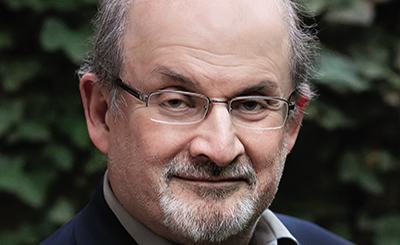
Saikat Majumdar, author of The Scent of God. Photo courtesy: Tribhuvan Tiwari (Outlook)
The novelist and critic on his third novel, The Scent of God, that explores the mesmeric power of religion and the sensory, amoral nature of polytheistic Hinduism, being an ‘ethnographer’ of memory, and his fascination with the non-modern
Novels, says Saikat Majumdar, come from a wild and unpredictable place, but they end up capturing the spirit of the times, sometimes even of the future. The novelist and critic, who is a professor of English and head of the department of creative writing at Ashoka University, says he sees himself as an ethnographer of memory, not of reality. Majumdar, who explores the mesmeric power of religion and the sensory, amoral nature of polytheistic Hinduism in his third novel, The Scent of God (Simon & Schuster India, 2019), says the present is a muddled continuum — the past always contains the future, and future, the past. “History and memory meet in all my novels. Memory is simply that which is available to you in sensory form; archives outside the realm of the sensory are what we call history. But our memory is also the memory of others, usually, our elders, and those are the murky zones where history and memory meet, such as with theatre in The Firebird (2015), and religion and sexuality in The Scent of God,” he says.
The universe of his first novel, Silverfish (2007), was made up of “the pulsation of the late 20th century modernity — quotidian life, the deadening impact of bureaucracy, and the throbbing banality of modern cities.” The Firebird, he says, sought to capture the wilderness of the non-modern in the composure of modern prose and the ritual and energy of performance. Excerpts from an interview:
Shireen Quadri: In your novel The Scent of God, you explore religion’s unimaginable hold over a secular democracy and trace the disturbing contours of religious violence that recently erupted in Delhi, killing nearly 50 people. Unlike your previous two novels, which delved into the lives of women in the past, this novel, based in Calcutta like the other two, has a certain degree of immediacy and urgency. In what ways has this novel been shaped by the rising tide of intolerance and hatred that has now begun to choke us, and frighten us out of our wits?
Saikat Majumdar: So far, India 2020 has been a nightmare. The year started off with the worst riot of the decade, and now everything is shut down due to the Coronovirus pandemic. Impossible not to see much symbolism here. But that’s how it is with history – the past always contains the future, and future, the past; the present is a muddled continuum. During my last visit to Calcutta, I was shocked to see the Islamophobia among bhadralok, middle and upper-middle class Bengalis, the tenor of conversation in parties, the way they freely mixed class and communal prejudice. Such is how a culture imagined to be liberal reveals itself as otherwise. Now that I look at The Scent of God, I realise I was unconsciously recording the seething intolerance, and the incipient rise of saffron power in Bengal in the late 1980s and early 1990s. It appeared in apparently innocuous things, such as a group of boys in a boarding school cheering for the Indian cricket team playing Pakistan and engaging in an imaginary rivalry with a neighbouring Muslim village. The young protagonist is drugged by the magnetic charisma of the Hindu monk who supervises them in the hostel. The story is based on a real Hindu monastic order in Bengal, a liberal one, that has, of late, tended to cosy up to the ruling Hindu majoritarian government. Novels come from a wild place, wild and unpredictable, but I realise they end up capturing the spirit of the times, sometimes even the future spirit.
Shireen Quadri: While religious violence is at the heart of your novel, it would be unfair to see it as just about that. Though it takes a look into a breeding ground of hate, it is essentially a story of love. The novel also hovers around other ideas like desire and abstinence, and the commingling of the spiritual with the sexual. The coming-of-age novel, set in an exclusively male boarding school of a Hindu Monastic order, depicts your protagonist Anirban's journey to adulthood — a journey that highlights how the wedge between communities is driven early on in young minds, preparing them for a life entrenched in hatred by indoctrination. What brought you to Anirban's story, and Kajol, and their quest for an impossible love in an unlikely backdrop?
Saikat Majumdar: The Scent of God, as I imagine it, is first and foremost a love story. I was more delighted when Times of India listed it as one of the Best Romance Novels of 2019 than when they listed it as a notable book on same-sex love, because the dream remains for the day when non-heteronormative love will get the same status as heteronormative love and won’t have to be singled out as “different”.
I was intrigued by the first arrival of sexual stirrings at puberty, when a human touch is all the body longs, not caring about the sex or gender of the person touching you, distinctions that come to you later, perhaps conditioned by society. Of course, the inspiration behind this novel is a life I used to know, as a student at a saffron school similar to the one described in The Scent of God. I remember the peculiar intimacies that grew between students there daily, the friendships hard to name — all within the smell of incense and flowers of the monastic world.
Shireen Quadri: The novel also pits several worlds and ideas against each other. The monk’s narrow, stifling and stultifying version of Hinduism is presented in conflict with Anirban’s aesthetic perception of prayer rituals. The sensory world of religious worship is shown to be in sharp contrast to the sensory nature of erotic desire. The idea of purity is contrasted against the profane, and love against lust. Sensual meets the sexual. In the school, detachment from the body and its desires is mandatory. In Anirban’s choice of defying this lies an act of rebellion, which is in contrast against the blind adherence of the rules of the school by other boys. The school, in some sense, stands as an embodiment of India, a secular democracy where religious strife runs deep. Did you work on sewing these elements into your narrative?
Saikat Majumdar: Several reviewers have pointed to the paradoxes of contemporary Indian democracy as they appear in the novel. I did not think of it in quite this way, but on hindsight, it makes real sense. After all, the novel is set in a boarding school which aspires to build future citizens. It is also a school that works under a Hindu religious identity, albeit a liberal one. But the students, for the most part, do not aspire to be monks (our protagonist is an exception), but they desire lives of secular success, which in India, is often defined by the yardsticks of careers such as engineering and medicine. So these are boys who pray and sing hymns twice daily but their goal is to crack the IIT entrance tests and become normative and productive members of civil society. The student body, too, is a microcosm of the nation today, with its class and communal prejudice, chronicled somewhat prophetically for the last decade of the 20th century — to the terrifying nation we inhabit today.
Shireen Quadri: There is a lot of empathy with which you portray the love between the two boys. Your depictions of their encounters are tender and nuanced. The novel created a lot of buzz as a novel dealing with gay love. Did you foresee this happening, considering it has rarely been in the Indian contemporary fiction? Could you tell us about some of the recent novels on the subject you have read and appreciated?
Saikat Majumdar: Naming non-normative forms of sexuality is important for purposes of political mobilisation. But, as an artist, I’m less interested in names than in forms of intimacy that are rather hard to name. Some of the attention this novel has received has come from the excitement over the abolition of Article 377 that was meant to penalise homosexuality. Queer people have celebrated this novel, and some of them have also criticised it for not being “activist” enough, but that, I feel, is not the essential call of art.
Indian writing, especially in the vernacular traditions, is rich with instances of such hard-to-classify intimacies. Probably the most famous is Ismat Chughtai’s “Lihaaf” that tells the stories of powerfully idiosyncratic intimacies that are often reductively described as homosexual. Or think of U.R. Ananthamurthy’s story “A Horse for the Sun”, where the character Venkat gives a massage to his old friend which is therapeutic and also something more. Or Amrita Pritam’s story “The Weed” where intimacies, both between and within genders, seem impossibly poetic and dangerously transgressive at the same time. Among the more recent novels, I thought Amrita Mahale’s novel Milk Teeth, which I loved, does a great job showing the self-hatred to which queer desire is often unfortunately doomed in middle-class India. Among other contemporary writers, R. Raj Rao, Hoshang Merchant, Nemat Sadat, Hansda Sowvendra Shekhar and others have created literature that can be more directly identified as representing homosexuality.

Shireen Quadri: In the novel, you also suggest that the violence unleashed by the students and monks studying in the religious school are linked to the denial of bodily desires. In desperation, the hungry boys secretly kill, roast, and eat pigeons. When he is struck by fits of rage, Premen Swami, a teacher, hits students with his whip, studded with metal, for even minor infractions. Do you see a link between the depraved acts of violence and sexually deprived lives of young men?
Saikat Majumdar: Yes, I think so. One form of research I did while writing this novel was to interview the alumni of the school on which this is modelled and ask about their experiences. One of them told me that he believed there were very clear links between the monks’ need to practise celibacy and their acts of physical violence, which included sports but also the brutal beatings of the young boys. Physical punishment thus becomes a channel for suppressed sexual desire, especially as flesh hits flesh. Same with the violent behaviour of the boys, such as when they catch pigeons and roast them live to eat. The monastic austerity imposed on them creates this simmering hunger and violence, which explodes from time to time, to invite an even more brutal regime of discipline and punish by the monks. And so the cycle continues.
Shireen Quadri: Like your previous two novels, your sentences in The Scent of God are evocative and lyrical. Do you think about the elements of style and the texture and structure of the text while working on your novels?
Saikat Majumdar: A moving sentence, a memorable phrase, for me these are the basic units of currency in fiction. Without these, gripping story, powerful character, all come to nothing. But good style, for me, does not mean flamboyant style, it is style that is honest and real; it can be either simple or complex depending on the call of the moment or the writer, but it must be a call that’s honest. I think over the years I’ve moved away from the idea of style as something clever and flamboyant to style that tries to stay bare and honest, but where honesty makes it haunting and lyrical, not straight and flat. I guess I have a natural writing style by which people identify me, but one’s style is simultaneously natural and cultivated — I revise and edit my manuscripts obsessively, and sometimes I wish I could revise subsequent editions, as the process never seems complete.
Shireen Quadri: Calcutta has been central to your stories. How has the city shaped your fiction?
Saikat Majumdar: Calcutta is the city where I grew up, and the city I left. Writing about a place of memory, always half-remembered, becomes an exercise separated not only by time and space, but also by a certain feeling. I’ve come to realise that I’m an ethnographer of memory, not of reality. It’s hard for me to write interestingly about a place when I’m physically there—it comes much better to me when I’ve left that place, and I’m groping my way through memory, which acts as a force of natural selection.
And Calcutta is an aesthete’s delight. It is a modern city in the historic sense of the term, in the sense in which that modernity is now in decline, or has been for the last four decades at least. This is the modernity that saw its daybreak with the Bengal Renaissance, and which was effectively stalled by the Communist regime inaugurated in 1977. The decay created by that stalled modernity has inspired both first two novels, Silverfish and The Firebird. The Scent of God is not set in Calcutta but in its penumbra; the school that inspires this novel is just a short drive off the southern tip of the city. The idyll of the ashram makes up part of the novel, but the other part is the dirt and grit of the city streets, and as you know, the protagonist has to make some hard choices in the end, between the city and the ashram — and between a heteronormative life and one that promises a different kind of love.
Shireen Quadri: In many ways, this novel, like Silverfish, unravels a writer’s experience with the real, the raw and the physical. The Firebird, on the other hand, was more of visceral, a work where history and memory met. How did you arrive at each of the three? How do you see these stories to be different? Is writing about the now more difficult since there is no luxury of the distance?
Saikat Majumdar: I like Silverfish, but it now feels very much like a first novel — and not the great first novel that some gifted writers write. I feel that there my approach to reality, including that of Calcutta, was a bit anthropological, with a kind of intellectual distance that took something away from its artistic power. In contrast, both The Firebird and The Scent of God had stories that took me by my throat and demanded to be told, there was indeed a visceral quality to them that I think was missing in my first novel. I think history and memory meet in all my novels. Memory is simply that which is available to you in sensory form; archives outside the realm of the sensory are what we call history. But our memory is also the memory of others, usually, our elders, and those are the murky zones where history and memory meet, such as with theatre in The Firebird, and religion and sexuality in The Scent of God.
Shireen Quadri: In Prose of the World: Modernism and the Banality of the Empire (2013), you wrote about how the sense of banality and boredom were common elements of the daily experience for people on the colonial periphery, and how this affective experience of colonial modernity has shaped the innovative aesthetics of modernist fiction. In your novels, how do you see yourself straying away from the conventional impulses of narration and its distinct narrative aesthetics?
Saikat Majumdar: Prose of the World celebrated literature’s rootedness in what I felt was the most distinctive feature of Western modernity: modern literature’s preoccupation with the banal — of stories about marks on the wall and entire novels about men and women just walking along city streets. The prose of the world, as in the title of the book, was disdained by the philosopher Hegel as the trivial stories of daily life, but that was, I argued, the most defining characteristic of literature since Enlightenment and Romanticism, and in a more radical way, with the broken interiority of modernism in the late-nineteenth and early-twentieth centuries. The universe of my first novel, Silverfish, was made up of the pulsation of this modernity — quotidian life, the deadening impact of bureaucracy, the throbbing banality of modern cities.
The Firebird was where things started to change. It sought to capture the wilderness of the non-modern in the composure of modern prose. The milieu, as before, was the stalled modernity of the late-20th-century Calcutta. But the real force in the novel, I now feel, is that of the pre-modern. It came through the primal terrors of childhood, the obsession with blood-kinship, the incestuous love for one’s mother and sister, and a persisting engagement with the spectacle of death. Most importantly, the novel sought to capture the ritual and energy of performance, which long predates the modern category of literature in print.
In many ways, The Scent of God continues my fascination with the non-modern. This time, it is the mesmeric power of religion. Particularly, it is about the sensory, amoral nature of polytheistic Hinduism, and endless erotic possibilities that lie within its layers. It all comes together in this boy’s life where spiritual and sexual awakening happen in the same moment, and in the same body. Hence the scent — the sensory aura — of the ultimate abstract, God.
More from The Byword
Comments
*Comments will be moderated











